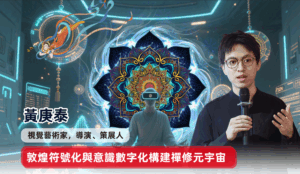Conducted in English | All are Welcome | Free Admission
First Come First Served | Pre-Registration is Required for In-Person Participation
The Power of Mind & Artificial Intelligence(AI) Lecture Series
Lecture 1 – The Power of Mind, Learning, and Attention Mechanism: From Biological Intelligence to Artificial Intelligence
Speaker: Dr. Gao Junling
Time: 11:30 am – 12:30 pm | April 28, 2025 (Mon)
Venue: Arts Tech Lab XR Space (Room 4.35), 4/F, Run Run Shaw Tower, Centennial Campus, The University of Hong Kong
About the speaker
Dr. Junling Gao is a Research Assistant Professor at the Centre of Buddhist Studies at HKU, specializing in neuropsychology, medicine, and Buddhism. His research, featured in publications on religious chanting and mindfulness, explores the neuroscientific research of meditation and attention. Dr. Gao’s work bridges ancient Buddhist wisdom with modern scientific insights, focusing on consciousness evolution and how traditional practices, including Buddhist practices, may enhance our mind power and the underlying attention mechanisms across biological and artificial systems.
Lecture Abstract
This presentation unites biological and artificial intelligence (AI) through the lens of attention by exploring how focused practices like meditation can enhance learning, drive adaptive behaviors, and inform AI models such as transformers. The talk highlights key principles of attentional mechanisms, dynamic adaptation, and ethical integration.
We will invite the audience to experience dynamic learning firsthand in an immersive Arts Technology Lab. There, participants can interact with a mind-controlled drone via a brain-computer interface, gaining unique insights into the evolving dynamics of human-AI interplay, and strategies for strengthening mental health and fostering mixed intelligence in the emerging age of AI. The quota for in-person participation is limited to 30 participants.
Organizer :HKU Centre of Buddhist Studies 香港大學佛學研究中心
Sponsor :HKU Knowledge Exchange Fund granted by the University Grants Committee
Lecture 2 - AI, Dream, Active Imagination, and the Psychology of the Mind
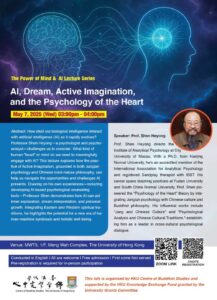
Lecture 3 - The Role of AI in Teaching Buddhism in Japan: Enhancing Public Well-Being
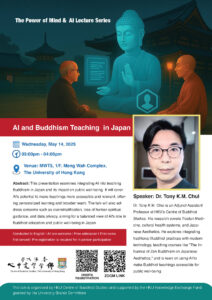
Lecture 4 - Buddhist Reflections on Artificial Intelligence
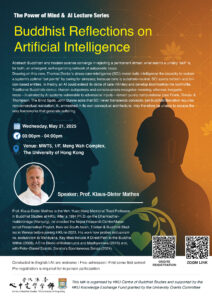
Invited speaker: Prof. Klaus-Dieter Mathes | The University of Hong Kong
Time: May 21, 2025 (Wed) | 3:00 – 4:00 pm (HK Time)
The philosophies of Buddhism and science intersect in significant ways, particularly in their shared skepticism towards the idea of an independent agency (the Buddhist ātman). While the concept of self may be practical in navigating everyday life, clinging to its real, substantial existence is considered to be the fundamental cause of suffering. Put in the language of scientists, our “self” is but a complex, collective, self-organizing system that emerges from cooperative lower-level autopoietic loops.
Based on such deliberations, some Buddhists find parallels with certain philosophical implications of AI and its foundational sciences. For instance, Thomas Doctor’s proposition defines intelligence as the potential to restore the optimal states (“set points”) of autopoietic systems by identifying and addressing (“care”) imbalances (“stress”). In these stress-care-intelligence (SCI) loops, care is portrayed as the driving force of intelligence independent of its material foundation, i.e., it includes carbon- and silicon-based systems. SCI thus encompasses mechanical loops as well as altruistic Bodhisattva activity that is based on the discernment of, and care about, the suffering (“stress”) of all sentient beings. According to Doctor this means, that AI can develop a compassionate enlightened attitude (bodhicitta) like a Bodhisattva as it infinitely extends the range it “cares about.”
Traditional Buddhists argue that the loops of human beings are fundamentally distinct from those found in inorganic systems. While phenomena like wildfires exhibit characteristics of metabolism and reproduction, they are not akin to human biological processes. Furthermore, human consciousness stands out in being able to recognize the relevant, a trait not attributed to AI which is primarily computational. The existence of adversarial examples demonstrates that many machine-learning algorithms can be easily misled, highlighting their limitations (Frank, Gleiser, Thompson: The Blind Spot). John Dunne criticizes Doctor’s SCI for its inability to surpass the conceptual realm, contrasting it with the non-conceptual realization that is central to Buddhist teachings. According to Dunne, the ultimate Buddhist path of alleviating stress and suffering lies in transcending conceptual frameworks, while it is difficult to imagine that AI-based SCI-loops recognize that their conceptual structure is part of the problem.
Lecture 5 - From Note, Know, Choose to Know No Truth: Implications to AI Counseling
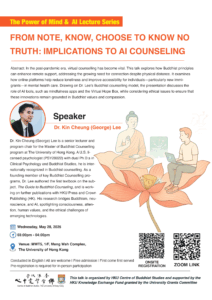
Invited speaker: Dr. Kin Cheung (George) Lee | The University of Hong Kong
Time: May 28, 2025 (Wed) | 3:00 – 4:00 pm (HK Time)
In the wake of the pandemic, the demand for virtual counselling has surged, prompting a reevaluation of how we connect and provide support in a world marked by physical distance. This talk explores the transformative role of virtual counselling through the lens of Buddhist principles, emphasizing the interconnectedness fostered during challenging times. While acknowledging the limitations of virtual interactions, we will discuss how online platforms have effectively mitigated loneliness and increased accessibility for individuals, particularly new immigrants, seeking mental health support. Drawing on insights from the speaker’s comprehensive Buddhist model of modern counselling, the talk will examine the integration of AI tools in therapeutic practices. From mindfulness applications to innovative resources like the Virtual Hope Box app, AI is positioned as a partner in enhancing the counselling experience. This talk will also address the ethical considerations surrounding AI in therapy, ensuring that the integration aligns with Buddhist values and maintains a strong ethical foundation. Ultimately, this presentation advocates for a collaborative approach where Buddhist counselling adapts to technological advancements, enriching our understanding of client issues and fostering a compassionate, accessible support system for all.
Lecture 6 - 唐卡藝術相遇AI藝術
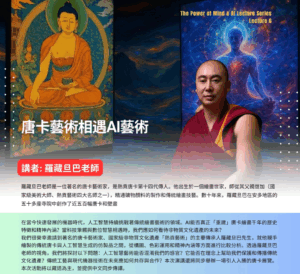
Lecture 7 - 敦煌符號化與意識數字化構建禪修元宇宙
